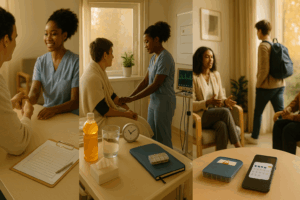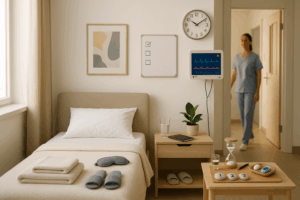In exploring the multifaceted nature of residential treatment, one might find unexpected revelations about its personalized approach to recovery. Beyond the anticipated clinical interventions, these programs often integrate tailored treatment plans that address the unique complexities of each individual’s journey. The inclusion of holistic therapies such as yoga and meditation offers a surprising dimension that complements traditional practices, emphasizing a well-rounded healing process. Additionally, the profound role of community and peer support in these settings cannot be overstated, fostering an environment of empathy and shared experiences. What other elements contribute to the transformative potential of these programs?
Personalized Treatment Plans
In the domain of residential treatment programs for alcohol and drug abuse, personalized treatment plans are pivotal in guaranteeing effective recovery. These plans are meticulously crafted through individual assessments, which explore the unique circumstances and needs of each resident. Acknowledging that substance abuse disorders manifest differently across individuals, these assessments consider factors such as the severity of the addiction, co-occurring mental health issues, and personal history. This thorough understanding forms the backbone of tailored interventions designed to address specific challenges faced by each resident. Tailored interventions are the cornerstone of personalized treatment plans. They offer an array of therapeutic modalities, including cognitive-behavioral therapy, motivational interviewing, and family therapy, each selected based on the individual’s assessment results. This specificity guarantees that residents engage in therapies most likely to resonate with their personal experiences and recovery goals.
Additionally, personalized treatment plans often include components aimed at enhancing life skills, fostering resilience, and developing coping mechanisms to manage triggers and stressors post-treatment. The empathetic, evidence-based approach of personalized treatment plans in residential settings not only enhances the efficacy of recovery but also empowers individuals to reclaim control over their lives, paving the way for sustainable sobriety. For those seeking more intensive support, Intensive Outpatient Programs (IOP) are an option to consider.
Holistic Therapy Approaches
Frequently, residential treatment programs incorporate holistic therapy approaches to complement traditional therapeutic modalities. These approaches emphasize the importance of the mind-body connection, acknowledging that mental health and physical well-being are deeply interrelated. Holistic therapies aim to treat the whole person, fostering healing that extends beyond symptom management to address underlying causes of distress. In residential settings, alternative therapies such as yoga, meditation, and acupuncture are employed to bolster emotional resilience and promote relaxation. Yoga, for instance, encourages mindfulness and self-awareness, allowing individuals to better manage stress and cravings. Acupuncture and other alternative therapies are believed to stimulate the body’s natural healing processes.
Evidence suggests that integrating these holistic approaches can enhance the efficacy of traditional treatments, leading to improved outcomes for those in recovery. By fostering a greater sense of balance and harmony, these therapies can help individuals develop healthier coping mechanisms and improve their overall quality of life. Understanding the value of holistic therapies provides insight into the all-encompassing care available, underscoring the commitment to healing the mind and body as a unified entity. For more detailed research on the effectiveness of holistic treatments within residential settings, you can refer to a scientific overview.
Community and Peer Support
An essential component of residential treatment programs is the inclusion of community and peer support, which plays a crucial role in the recovery journey. This support system fosters an environment where individuals can share experiences, challenges, and successes, promoting a sense of belonging and accountability. Group therapy sessions are a cornerstone of this model, providing a structured setting where participants can explore their struggles with substance use alongside others facing similar issues. The shared experiences in group therapy help reduce feelings of isolation and stigma, which are common barriers in the path to recovery. Peer feedback is another crucial element, offering individuals the opportunity to receive constructive insights from those who have walked a similar path.
This feedback can be instrumental in helping individuals recognize patterns in their behavior and thought processes that may have contributed to their substance use. It can validate personal experiences, fostering a sense of empowerment and motivation to change. Research has consistently shown that peer support in residential treatment settings enhances treatment outcomes by building resilience, improving coping strategies, and promoting long-term recovery. The collaborative nature of community and peer support is essential in creating a sustainable recovery framework.
Life Skills Development
While community and peer support build a strong foundation for recovery, developing practical life skills is equally important in residential treatment programs. Life skills development is an integral component that often surprises individuals entering treatment, as it extends beyond addressing substance use disorders to fostering personal growth and independence building. These skills encompass a wide range of competencies, including financial management, effective communication, time management, and self-care practices. Empirical evidence underscores the significance of life skills in sustaining long-term recovery. Studies reveal that individuals equipped with robust life skills exhibit higher rates of successful reintegration into society and are less likely to relapse.
In residential treatment, structured activities and workshops are designed to teach and enhance these skills, empowering individuals to navigate everyday challenges with confidence. Moreover, life skills development serves as a catalyst for personal growth. It encourages individuals to set achievable goals, make informed decisions, and cultivate resilience. By focusing on independence building, treatment programs aim to reduce reliance on substances and foster self-sufficiency. This aspect of treatment not only surprises but also profoundly transforms individuals, providing them with the tools necessary to lead fulfilling and autonomous lives post-recovery. To learn more about comprehensive residential treatment offerings, consider exploring luxury rehab centers in New Jersey.

Final Thoughts
Residential treatment offers a multifaceted approach to recovery that may defy initial expectations. With personalized treatment plans, individuals receive care tailored to their specific needs, enhancing the effectiveness of interventions. The integration of holistic therapies like yoga and meditation complements traditional methods, promoting overall well-being. A strong emphasis on community and peer support provides a foundation for enduring connections and understanding. Life skills development further equips individuals with tools necessary for sustainable recovery, underscoring the all-encompassing nature of residential treatment programs.
If you or a loved one is struggling with addiction, remember that you don’t have to navigate this journey alone. At BlueCrest Recovery, we’re here to provide the support and resources needed to help you move from a place of powerlessness to one of strength and healing. Don’t hesitate to reach out to our team online or call us today. Let us walk with you on your journey to recovery. Follow us on Facebook for ongoing insights, encouragement, and support.
Frequently Asked Questions
What Should I Bring With Me to a Residential Treatment Center?
When preparing for a stay at a residential treatment center, consider packing essentials such as comfortable clothing, toiletries, and any necessary medications. Personal belongings like journals or books can provide comfort. Communication options, such as a list of important contacts, may be useful. Some centers may offer remote work opportunities, so inquire ahead if this is relevant. Always check with the facility for specific guidelines on what to bring.
How Long Is the Typical Stay in a Residential Treatment Program?
The average duration of a stay in a residential treatment program typically ranges from 30 to 90 days, depending on the individual’s needs and the specific program’s framework. This timeframe is considered ideal for maximizing treatment effectiveness. Longer stays may be recommended for individuals requiring more intensive care. Evidence suggests that extended treatment durations correlate with better outcomes, providing sufficient time for individuals to develop coping strategies and engage in thorough therapy. The Youth Residential Treatment program offers detailed information on options available for youths.
Are Visitors Allowed During My Time in the Treatment Center?
The visitors policy in residential treatment centers varies, often incorporating communication restrictions to foster focus on recovery. Typically, centers allow visitors during designated hours, but only after a certain phase of treatment is completed. These restrictions are intended to minimize distractions and support the therapeutic environment. Communication with family and friends is usually encouraged through monitored channels, ensuring that connections are maintained while prioritizing the patient’s healing journey.
What Is a Typical Daily Schedule Like in Residential Treatment?
A typical daily schedule in residential treatment is structured to promote recovery and well-being. The day usually starts with breakfast, followed by individual therapy sessions. Group activities are integral, fostering peer support and shared experiences. Meal times are scheduled to guarantee proper nutrition, while designated downtime allows for reflection and personal development. Evidence-based practices guide this regimen, creating a balanced environment that supports both psychological and physical healing in an empathetic manner.
Can I Continue My Education or Work Remotely During Treatment?
Balancing responsibilities such as continuing education or remote work during residential treatment requires careful coordination with the treatment facility. Many centers offer flexible schedules and support systems to accommodate such needs, recognizing the importance of maintaining professional and educational commitments. Remote work opportunities may be facilitated through available technology, ensuring patients can fulfill their obligations while receiving necessary care. This approach promotes recovery without compromising career or academic progress.




















